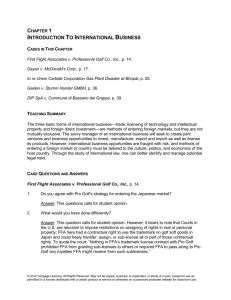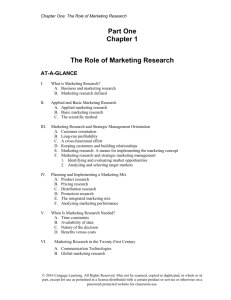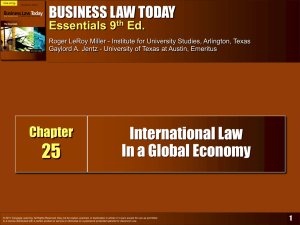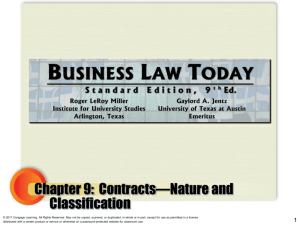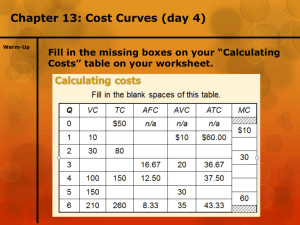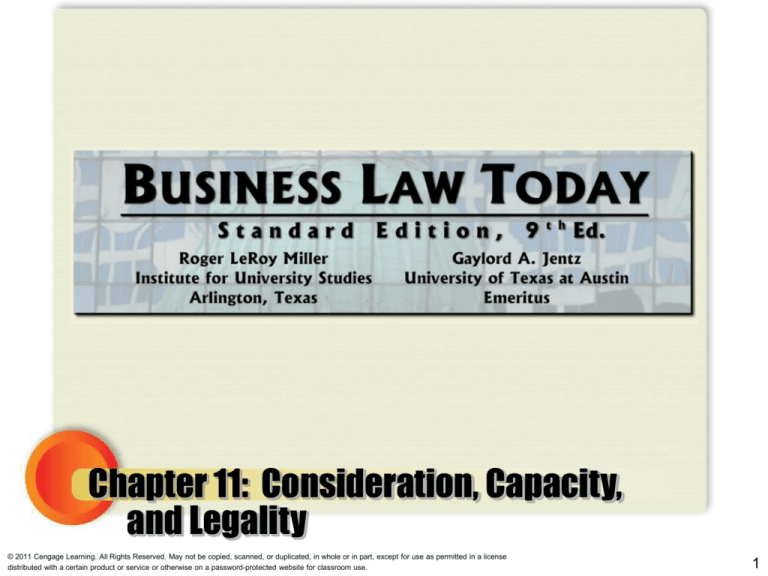
Chapter 11: Consideration, Capacity,
and Legality
© 2011 Cengage Learning. All Rights Reserved. May not be copied, scanned, or duplicated, in whole or in part, except for use as permitted in a license
distributed with a certain product or service or otherwise on a password-protected website for classroom use.
1
Learning Objectives
• What is consideration? What is required for
consideration to be legally sufficient?
• In what circumstances might a promise be
enforced despite lack of consideration?
• Does a minor have the capacity to enter into an
enforceable contract? What does it mean to
disaffirm a contract?
• Under what circumstances will a covenant not
to compete not to compete be enforceable?
When will such covenants not be enforced?
• What is an exculpatory clause? Under what
circumstances might exculpatory clauses be
enforced when will they not be enforced?
© 2011 Cengage Learning. All Rights Reserved. May not be copied, scanned, or duplicated, in whole or in part, except for use as permitted in
a license distributed with a certain product or service or otherwise on a password-protected website for classroom use.
2
Consideration
• Consideration is value given in return
for a promise.
• Elements:
– Something of legally sufficient value given in
exchange for a promise and
– That is bargained-for-exchange between the
parties.
• Adequacy of Consideration.
– Courts generally do not look for “how much”
consideration” is given.
© 2011 Cengage Learning. All Rights Reserved. May not be copied, scanned, or duplicated, in whole or in part, except for use as permitted in
a license distributed with a certain product or service or otherwise on a password-protected website for classroom use.
3
Contracts That Lack Consideration
• Pre-Existing Duty.
– A promise to do what one is already legally
obligated to do is not consideration.
– Unforeseen Difficulties.
– Rescission and New Contract.
© 2011 Cengage Learning. All Rights Reserved. May not be copied, scanned, or duplicated, in whole or in part, except for use as permitted in
a license distributed with a certain product or service or otherwise on a password-protected website for classroom use.
4
Contracts That Lack Consideration
• Past Consideration.
– A promise made in return for actions or
events that have already taken place are
unenforceable.
Case 11.1 Access Organics, Inc. v.
Hernandez.
Noncompete agreement was invalid because
it was not supported by consideration.
© 2011 Cengage Learning. All Rights Reserved. May not be copied, scanned, or duplicated, in whole or in part, except for use as permitted in
a license distributed with a certain product or service or otherwise on a password-protected website for classroom use.
5
Contracts That Lack Consideration
• Illusory Promises.
– If the terms of performance are so uncertain
that the promisor has not legally promised
anything, the promise is illusory.
– Option to Cancel clauses.
© 2011 Cengage Learning. All Rights Reserved. May not be copied, scanned, or duplicated, in whole or in part, except for use as permitted in
a license distributed with a certain product or service or otherwise on a password-protected website for classroom use.
6
Settlement of Claims
• Accord and Satisfaction.
– Debtor and Creditor agree on lesser amount.
• Release.
– One of the parties forfeits the right to purse
legal claim against the other.
• Covenant Not to Sue.
– Parties substitute a contractual obligation for
some other type of legal action.
© 2011 Cengage Learning. All Rights Reserved. May not be copied, scanned, or duplicated, in whole or in part, except for use as permitted in
a license distributed with a certain product or service or otherwise on a password-protected website for classroom use.
7
Promissory Estoppel
• Promissory Estoppel (“detrimental
reliance”) doctrine applies when a person
relies on the promise of another to her legal
detriment. Promisor is “estopped”
(precluded) from revoking the promise.
• Elements:
–
–
–
–
–
Clear and definite promise
Promisor expected promisee would rely.
Promisee reasonably relies by acting.
Reliance with definite and substantial detriment.
Enforcement of promise is necessary to avoid
injustice.
© 2011 Cengage Learning. All Rights Reserved. May not be copied, scanned, or duplicated, in whole or in part, except for use as permitted in
a license distributed with a certain product or service or otherwise on a password-protected website for classroom use.
8
Contractual Capacity
• The legal ability to enter into a
contractual relationship.
– Full competence.
– No competence.
– Limited competence.
© 2011 Cengage Learning. All Rights Reserved. May not be copied, scanned, or duplicated, in whole or in part, except for use as permitted in
a license distributed with a certain product or service or otherwise on a password-protected website for classroom use.
9
Minors
• In most states, a person is no longer a
minor for contractual purposes at the
age of 18.
• A minor can enter into any contract
that an adult can.
• A contract entered into by a minor is
voidable at the option of that minor.
© 2011 Cengage Learning. All Rights Reserved. May not be copied, scanned, or duplicated, in whole or in part, except for use as permitted in
a license distributed with a certain product or service or otherwise on a password-protected website for classroom use.
10
Minor’s Right to Disaffirm
• A contract can be disaffirmed at any
time during minority or for a
reasonable period after the minor
comes of age.
• Minor must disaffirm the entire
contract.
• Disaffirmance can be expressed or
implied.
© 2011 Cengage Learning. All Rights Reserved. May not be copied, scanned, or duplicated, in whole or in part, except for use as permitted in
a license distributed with a certain product or service or otherwise on a password-protected website for classroom use.
11
Minor’s Obligation on Disaffirmance
• In most states, minor need only return
the goods (or other consideration)
subject to the contract, provided the
goods are in the minor’s possession
or control.
• In increasing number of states, the
minor must restore the adult to the
position held before the contract was
made.
© 2011 Cengage Learning. All Rights Reserved. May not be copied, scanned, or duplicated, in whole or in part, except for use as permitted in
a license distributed with a certain product or service or otherwise on a password-protected website for classroom use.
12
Exceptions to Minor’s Right to Disaffirm
• Misrepresentation of Age.
– Generally, minor can disaffirm the contract.
– But some states prohibit disaffirmance and
hold the minor liable.
• Contracts for Necessaries.
– Contracts for food, clothing, shelter may be
disaffirmed by minor, who remains liable for
the reasonable value of goods or services.
© 2011 Cengage Learning. All Rights Reserved. May not be copied, scanned, or duplicated, in whole or in part, except for use as permitted in
a license distributed with a certain product or service or otherwise on a password-protected website for classroom use.
13
Exceptions to Minor’s Right to Disaffirm
• Insurance.
– Not viewed as necessaries, so minor can
disaffirm contract and recover all premiums
paid.
• Loans.
– Seldom considered to be necessaries.
– Exception:
• Loan to a minor for the express purpose of
enabling the minor to purchase necessaries.
© 2011 Cengage Learning. All Rights Reserved. May not be copied, scanned, or duplicated, in whole or in part, except for use as permitted in
a license distributed with a certain product or service or otherwise on a password-protected website for classroom use.
14
Ratification
• Occurs when a minor, on or after
reaching majority, indicates (expressly
or impliedly) an intention to become
bound by a contract made as a minor.
• Executed v. Executory contracts.
© 2011 Cengage Learning. All Rights Reserved. May not be copied, scanned, or duplicated, in whole or in part, except for use as permitted in
a license distributed with a certain product or service or otherwise on a password-protected website for classroom use.
15
Parent’s Liability
• Contracts.
– Parents not liable (This is why parents are
usually required to sign any contract made
with a minor).
• Torts (Statutes Vary):
– Minors are personally liable for their own torts.
– Liability imposed on parents only for willful
acts of their minor children.
– Liability imposed on parents for their children
negligent acts that result from their parents’
negligence.
© 2011 Cengage Learning. All Rights Reserved. May not be copied, scanned, or duplicated, in whole or in part, except for use as permitted in
a license distributed with a certain product or service or otherwise on a password-protected website for classroom use.
16
Intoxicated Persons
• Lack of contractual capacity at the time
the contract is being made.
• Contract can be either voidable or
valid.
– Courts look at objective indications to
determine if contract is voidable.
• If voidable:
– Person has the option to disaffirm, or
– Person may ratify the contract expressly or
impliedly.
© 2011 Cengage Learning. All Rights Reserved. May not be copied, scanned, or duplicated, in whole or in part, except for use as permitted in
a license distributed with a certain product or service or otherwise on a password-protected website for classroom use.
17
Mentally Incompetent Persons
• Void.
– If a person has been adjudged mentally incompetent
by a court of law and a guardian has been appointed.
• Voidable.
– If the person does not know he or she is entering into
the contract or lacks the mental capacity to
comprehend its nature, purpose, and consequences.
• Valid.
– If person is able to understand the nature and effect
of entering into a contract yet lacks capacity to
engage in other activities.
– Lucid Interval.
© 2011 Cengage Learning. All Rights Reserved. May not be copied, scanned, or duplicated, in whole or in part, except for use as permitted in
a license distributed with a certain product or service or otherwise on a password-protected website for classroom use.
18
Legality
• A contract to do something prohibited
by federal or state statutory law is
illegal and therefore void (never
existed).
• Contracts Contrary to Statute.
– Contracts to commit a crime.
– Usury.
– Gambling.
– Licensing Statutes.
© 2011 Cengage Learning. All Rights Reserved. May not be copied, scanned, or duplicated, in whole or in part, except for use as permitted in
a license distributed with a certain product or service or otherwise on a password-protected website for classroom use.
19
Contracts Contrary to Public Policy
• Contracts in Restraint of Trade.
– Covenants not to Compete and the Sale of an
Ongoing Business.
– Covenants Not to Compete in Employment
Contracts are legal as long as the duration
and geographic limits are reasonable.
Case 11.2 Comedy Club, Inc. v.
Improv West Associates.
Covenant not to compete for 14 years
covering 48 states was too broad and
therefore invalid.
© 2011 Cengage Learning. All Rights Reserved. May not be copied, scanned, or duplicated, in whole or in part, except for use as permitted in
a license distributed with a certain product or service or otherwise on a password-protected website for classroom use.
20
Contracts Contrary to Public Policy
• Unconscionable Contracts or Clauses.
– Procedural Unconsionability: adhesion
contracts.
– Substantive Unconsionability: when terms of
contract are oppressive or overly harsh.
© 2011 Cengage Learning. All Rights Reserved. May not be copied, scanned, or duplicated, in whole or in part, except for use as permitted in
a license distributed with a certain product or service or otherwise on a password-protected website for classroom use.
21
Unconscionable Contracts
© 2011 Cengage Learning. All Rights Reserved. May not be copied, scanned, or duplicated, in whole or in part, except for use as permitted in
a license distributed with a certain product or service or otherwise on a password-protected website for classroom use.
22
Contracts Contrary to Public Policy
• Exculpatory Clauses.
– Release a party from liability in the event of
monetary or physical injury, no matter who is
at fault. Courts generally view these clauses
with disfavor.
Case 11.3 Speedway SuperAmerica,
LLC v. Erwin.
Exculpatory clause was invalid because of the
unequal bargaining power between a chain of
convenience stores and one person.
© 2011 Cengage Learning. All Rights Reserved. May not be copied, scanned, or duplicated, in whole or in part, except for use as permitted in
a license distributed with a certain product or service or otherwise on a password-protected website for classroom use.
23
Effect of Illegality
• Justifiable Ignorance of the Facts.
• Members of Protected Classes.
• Withdrawal from an Illegal Agreement.
• Severable or Divisible Contracts.
• Contract Illegal through Fraud, Duress,
or Undue Influence.
© 2011 Cengage Learning. All Rights Reserved. May not be copied, scanned, or duplicated, in whole or in part, except for use as permitted in
a license distributed with a certain product or service or otherwise on a password-protected website for classroom use.
24




